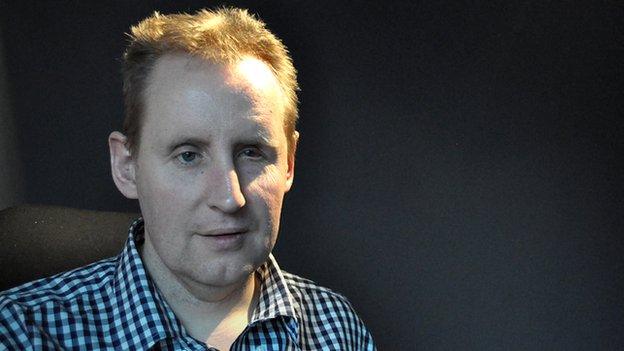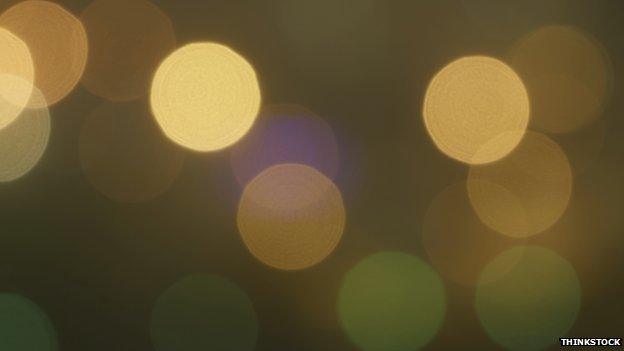Do blind people really experience complete darkness?
- Published

BBC journalist Damon Rose completely lost his sight as a child, but he says his world isn't pitch black. So what exactly does he see?
It's often assumed that blind people experience complete darkness, but in my experience this is far from the truth.
I appreciate this is going to sound odd coming from a blind person but when people ask me what I miss most about not being able to see, my answer is always "darkness".
Let me explain. I am one of a very small number of people who have no sight whatsoever. I'm properly blind. A "total" as we used to say at school.
I lost my sight 31 years ago thanks to ill-advised surgery, and on my blind person's registration certificate it has three, now very faded letters - NLP, no light perception.
The logical assumption is that when sight is snuffed out, a person must be left in darkness. If you dive under the bed covers you can't see anything at all. If you close your eyes then everything turns to black. So, blind equals black? It makes sense, right? Apparently not.
Though I've had the cord cut between my eyes and my brain, it seems that the world has not turned black. All metaphors, similes, analogies, and literary flourishes about blindness and darkness should henceforth cease to be used because I'm saying it's far from dark. It is, in fact, quite the opposite.
So what replaces 3D technicolour vision once it's gone? The answer - at least in my case - is light. Lots of it. Bright, colourful, ever-changing, often terribly distracting, light.
How do I even begin to describe it? Let me have a go. Right now I've got a dark brown background, with a turquoise luminescence front and centre. Actually it's just changed to green… now it's bright blue with flecks of yellow, and there's some orange threatening to break through and cover the whole lot.
The rest of my field of vision is taken up by squashed geometric shapes, squiggles and clouds I couldn't hope to describe - and not before they all change again anyway. Give it an hour, and it'll all be different.
If I try to block out all this distraction by closing my eyes it doesn't work. It never goes away.
I miss those peaceful moments of near darkness: walking at night-time while focusing on the streetlights ahead, the atmospheric shadows in a room with a real fire burning, or travelling home late in the back of my dad's car glimpsing cat's eyes lighting up in the middle of the road.

Blindness for Damon is "a kind of visual tinnitus"
For me, dark has come to signify quiet, and because my built-in fireworks never go away I describe what I've got as a kind of visual tinnitus.
When I first went blind I thought the brightly coloured lights were a sign my eyes were trying to work again. It gave me some hope and I was quite fascinated by it. I used to sit and stare at it. Now I know that it's my brain making up for the fact that it no longer receives any pictures.
Some people of faith have occasionally tried to tell me that I'm seeing the after-life, and I never know how to respond to that. But what I have never been able to find out is whether other people who have no light perception also see what I see.
And, assuming that full vision and driving a car are not on offer, do they also long for a bit of darkness?
Do you relate to Damon's experience or do you see something completely different? Email us ouch@bbc.co.uk
Follow @BBCOuch, external on Twitter and on Facebook, external, and listen to our monthly talk show